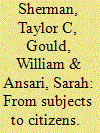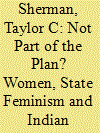|
|
|
Sort Order |
|
|
|
Items / Page
|
|
|
|
|
|
|
| Srl | Item |
| 1 |
ID:
126169


|
|
|
|
|
| Publication |
2013.
|
| Summary/Abstract |
Charting the rise and fall of the Grow More Food programme in India, this article explores a set of tensions that characterised development policies in the first decade after Independence in India. The post-colonial Indian state staked its legitimacy on securing economic independence for India, and, in particular, on being able to feed its citizens without resorting to importing food. The transition to food independence, however, was fraught and contested. In particular, this piece argues, the plans to get the nation to 'Grow More Food' as part of this drive towards national self-sufficiency were marked by a conflict between the dream of providing the benefits of development to all Indians and the reality that independent India's resources were extremely limited. In addition, this transition also involved a transformation in the nature of nationalism. The ruling Indian National Congress struggled to formulate a post-colonial nationalism because it was torn between using the state for development and urging the people to shape their own destiny outside of the state. It was also deeply ambivalent about rural citizens, who were viewed both as a burden and as a potentially limitless public resource. This article suggests that one of the defining features of post-colonial development was the tension between scientific and democratic development.
|
|
|
|
|
|
|
|
|
|
|
|
|
|
|
|
| 2 |
ID:
089381


|
|
|
|
|
| Publication |
2009.
|
| Summary/Abstract |
The paper attempts to understand the challenges and opportunities which the penal settlement at Port Blair in the Andaman Islands presented to colonial governments in twentieth-century India. To this end, the paper examines a scheme drawn up in the 1920s which saw the introduction of a much more liberal regime for convicts in Port Blair. Under these plans, convicts were granted access to land and encouraged to bring their families from the mainland. This research reveals that the policies which determined the history of the settlement in this period were defined by two tensions. First, there was a constant battle between the central authorities and provincial governments over the shape and purposes of the settlement. Second, there was a contradiction between the penal objectives of the colony and the larger strategies which aimed to develop the islands for the greater British empire.
|
|
|
|
|
|
|
|
|
|
|
|
|
|
|
|
| 3 |
ID:
102035


|
|
|
|
|
| Publication |
2011.
|
| Summary/Abstract |
This special issue of Modern Asian Studies explores the shift from colonial rule to independence in India and Pakistan, with the aim of unravelling the explicit meanings and relevance of 'independence' for the new citizens of India and Pakistan during the two decades after 1947. While the study of postcolonial South Asia has blossomed in recent years, this volume addresses a number of imbalances in this dynamic and highly popular field. Firstly, the histories of India and Pakistan after 1947 have come to be conceived separately, with many scholars assuming that the two states developed along divergent paths after independence. Thus, the dominant historical paradigm has been to examine either India or Pakistan in relative isolation from one another. While a handful of very recent books on the partition of the subcontinent have begun to study the two states simultaneously, very few of these new histories reach beyond the immediate concerns of partition. Of course, both countries developed out of much the same set of historical experiences. Viewing the two states in the same frame not only allows the contributors to this issue to explore common themes, it also facilitates an exploration of the powerful continuities between the pre- and post-independence periods.
|
|
|
|
|
|
|
|
|
|
|
|
|
|
|
|
| 4 |
ID:
102044


|
|
|
|
|
| Publication |
2011.
|
| Summary/Abstract |
Whilst the history of the Indian diaspora after independence has been the subject of much scholarly attention, very little is known about non-Indian migrants in India. This paper traces the fate of Arabs, Afghans and other Muslim migrants after the forcible integration of the princely state of Hyderabad into the Indian Union in 1948. Because these non-Indian Muslims were doubly marked as outsiders by virtue of their foreign birth and their religious affiliation, the government of India wished to deport these men and their families. But the attempt to repatriate these people floundered on both political and legal shoals. In the process, many were left legally stateless. Nonetheless, migrants were able to creatively change the way they self-identified both to circumvent immigration controls and to secure greater privileges within India.
|
|
|
|
|
|
|
|
|
|
|
|
|
|
|
|
| 5 |
ID:
178866


|
|
|
|
|
| Summary/Abstract |
The 1950s are often derided in the scholarship as a period of welfarist policies which reinforced women’s role in the family and entrenched women’s economic dependence. This paper examines the Central Social Welfare Board, and in particular its Welfare Extension Projects, to provide a new characterisation of the approach to women’s issues during the period. It argues that the Central Social Welfare Board, with its unique administrative structure, its preference for voluntary activity, and its adherence to persuasion as a mode of action reflected many of the characteristics of Indian socialism of the time. It also sketches, from this angle, a partial picture of state feminism in India. In the Central Social Welfare Board, state feminism was concerned with the gradual transformation of women and a radical, if short-lived, makeover of the state.
|
|
|
|
|
|
|
|
|
|
|
|
|
|
|
|
|
|
|
|
|